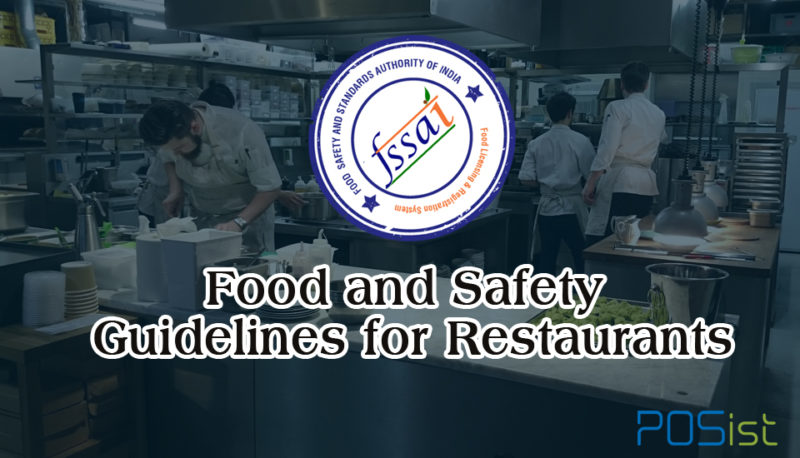Running a restaurant business is not an easy task. While sustaining the business is a plateful in itself, one must also not forget to abide by the rules and guidelines set up by the FSSAI. There are specific FSSAI Food Licensing & Registration System guidelines that all Restaurants and Food Establishments should follow. Industry bodies like FSSAI, Regional Municipal corporation body, sale tax, and income tax bodies are continuously eyeing restaurants operations, and not complying with these guidelines can result in strict action against the restaurants, and also lead to them shutting down. In our previous articles, we have discussed the impact of food licenses on the restaurant business and a small guide article on how to get the food licenses. In this article, we present the checkpoints of operating restaurant business from the eye of FSSAI.
FSSAI Food Licensing & Registration System Checklist For Catering and Food Service Establishments
The Food Safety & Standards Authority of India (FSSAI) is launching a cloud-based, upgraded new food safety compliance online platform called Food Safety Compliance System (FoSCoS). The module will be offering licensing, registration, inspection, and annual return modules. The following are the essential FSSAI food licensing & registration system guidelines that you should ensure are followed at your restaurant and food business premises.
1. Good Manufacturing Practices for the Whole Premise
The FSSAI food licensing & registration system guidelines require that the restaurant has proper food preparation areas, toilets, and changing facilities.
a) Food Preparation Areas- Cooking and frying should be done under chimney having an appropriate suction capacity.
b) Hand washing facilities and toilets- The restaurant should have an adequate number of wash-hand basin fitted with taps for running hot and cold water.
c) Changing facilities- Proper facilities should be provided to the staff to change their clothes wherever necessary.
2. Good Food Hygiene Practices
Restaurant premises shall be located in a clean place and free of filthy surroundings and shall maintain the overall hygienic environment. All new restaurants shall set up away from environmentally polluted areas. There should be adequate ventilation.
a) Cleaning- Working area and equipment/ utensils should be cleaned appropriately.
b) Water Supply- There should be an adequate supply of potable water. The water should be examined chemically and bacteriologically by a NABL accredited laboratory. Ice and steam wherever in use should be made from the same portable water.
c) Raw Materials- Certain FSSAI guidelines should be followed in the handling and preparation of raw materials.
Preparation of Fruits/ Vegetables
- Uncooked, ready-to-eat fruits & vegetables should be treated before peeling in 50 ppm chlorinated water.
- The equipment used for peeling/ cutting etc. of fruits & vegetables should be clean and of non-absorbent food-grade materials.
Preparation of Non-Veg. Product
- Raw meat and processed meat should be kept separate from other food items.
- The used surface should be adequately cleaned with anti-bacterial agents.
d) Cooking
- The preparation/ processing/ cooking should be adequate to eliminate and reduce hazards.
- Cooking oil should not be repeatedly used for frying.
e) Chilling
The fridge and display units should be kept in good working condition and maintained at a temperature of 5 degree Celsius.
f) Cross-contamination
- Raw food/ meat/ poultry and ready-to-eat foods should be kept separate.
- Staff must be trained enough to avoid cross-contamination.
3. Personal Hygiene
According to the FSSAI food licensing & registration system guidelines, personal hygiene must also be maintained among the staff members.
- Food production personnel should be appropriately dressed in clean protective clothing, hair covering, footwear, gloves, facial mask, etc.
- Food production personnel should use disinfection and handwashing facilities whenever they enter or re-enter food processing areas and hand washing facilities to be equipped with the non-hand operated taps, liquid soaps, and disposable paper towels and covered waste bins.
- Restriction to unhygienic practices such as eating, smoking, spitting, etc., within the food processing premises are adhered to and strictly enforced.
4. Transportation and Handling of Food
The vehicles used to transport foods must be maintained in good repair and kept clean. Foods, while in transport in packaged form or containers, shall maintain the required temperature.
- Food vehicles should be internally lined with appropriate material and provided with suitable facilities.
- Chilled/ frozen food products should be transported at appropriately regulated temperatures.
- Vehicles should be clean, free from a pest infestation, and other contamination.
- Separate food vehicles should be used for raw and finished products.
5. Storage
The FSSAI Food Licensing & Registration System Guidelines also state that the storage of the raw materials, as well as the prepared food items, must be stored properly. The following points should be kept in mind while storing food items.
- Adequate, well-designed storage rooms/ areas with appropriate storage facilities should be available and should be impervious to moisture, clean, free from a pest infestation, and well maintained.
- Chemicals, detergents, and other cleaning materials should be stored in designated areas away from food items
- No vessel, container, or other equipment, the use of which is likely to cause metallic contamination detrimental to health, shall be employed in the preparation, packing, or storage of food. (Copper or brass vessels shall have
the proper lining). - Ingredients, intermediate and finished products should be handled and stored in a manner to prevent damage, contamination, and spoilage.
- Proper stock rotation (First-in-first-out) should be practiced to prevent deterioration and spoilage of raw materials and finished products.
- Returned, defective or suspect products must be identified and isolated in designated areas or containers.
6. Special Requirements for High-Risk Foods
There are certain high risk-food items for which special care should be taken while storing as well as preparing. We have discussed them below.
a) Cut fruits/ salads, fresh juices, and beverages- Juice dispensing machines should be cleaned and free from contaminants.
b) Confectionary products- Confectionery products must be refrigerated appropriately with labels indicating the date of expiry.
c) Meat, poultry, and fish products
- Non-veg products must be washed with potable water.
- The processing area should be clean and properly disinfected.
d) Water-based chutneys, sauces, etc.
- Cleaned and disinfected chopping boards should be used.
- Permitted food additives should be used as per the recommended quantities, wherever necessary.
- Sauces and chutneys must be stored in a glass/ food grade plastic container with a proper lid.
e) Fried foods
- Excellent quality/ branded oil/ fats should be used for preparation, frying, etc.
- Packaged oil must be used.
- Oil should not be repeatedly used for deep frying.
7. Documentation and Records
The FSSAI Food Licensing & Registration System Guidelines For Restaurants also state that proper documentation of the food product should be done and records should be maintained.
- Test reports from own or NABL accredited/ FSSAI notified labs regarding microbiological contaminants in food items should be available all the time.
- Records of daily production, the raw material utilized, and sales should be maintained.
- A periodic audit should be done of the whole system according to the Standard Operating Procedure conducted regarding Good Manufacturing Practices/ Good Hygienic Practices (GMP/ GHP) system.
- Appropriate records of food processing/ preparation, food quality, laboratory test results, pest control, etc. for one year or the shelf life of the product, whichever is more.
- Records of sale and purchase that the food product sold to registered/ licensed vendor and raw material purchased from a registered/ licensed supplier.
For more information, you can refer to this document. Let us know your ideas and suggestions in the comments below!




















FSSAI Food Licensing guidelines are something every restaurant is supposed to abide by. Thank you for the detailed article it is of great help
Very comprehensive and informative, great work restaurant times
This post is very useful for all restaurant owners and people wanting to start a food business. It is important to follow the FSSAI food safety guidelines to ensure hygiene and food standards are maintained.
FSSAI guidelines can be considered as the nerve system for working of any restaurant, the points mentioned above are very informative and helpful. Great article.
I just wanted to understand , if a restaurant is to be opened in residential apartments (having Shops in Basement) is there any specific rule for that? is NOC to be obtained by the flat owners? is the licence from municipal corporation is needed.